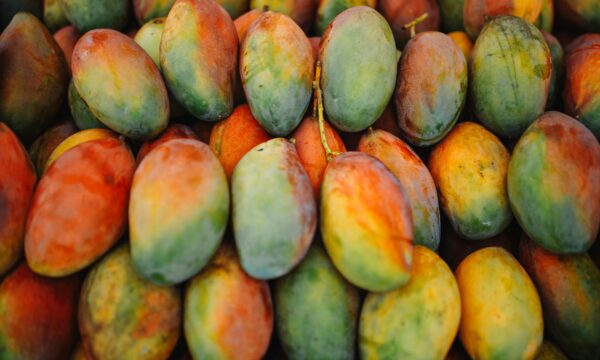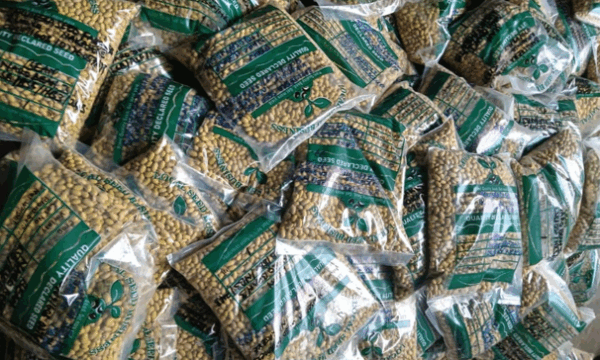Why is plant health so important? Plants account for 80% of what we eat and 98% of the oxygen we breathe. They are essential for food security and a healthy world.
Better plant health could help end hunger, alleviate poverty, protect biodiversity, and boost economic development. Yet, our planet’s plant health is under threat.
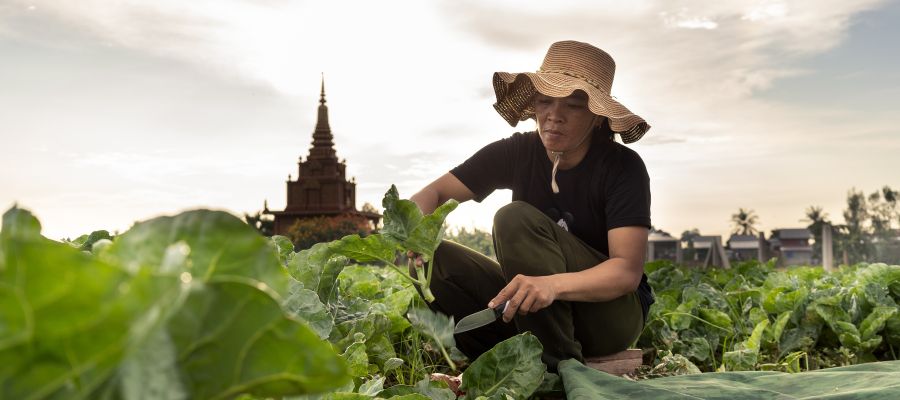
Plant health and crop loss
Pests and diseases destroy up to 40% of all crops. Our changing climate is intensifying the situation. It increases the threat posed by non-native species by creating new opportunities for them to become invasive.
Among the most devastating invasive species are desert locust, fall armyworm, papaya mealybug, fusarium wilt and cassava brown streak disease. Through the PlantwisePlus programme, CABI has direct experience helping smallholder farmers monitor and manage these species.
PlantwisePlus – improving plant health
CABI’s global PlantwisePlus programme is responding to farmers’ needs and the systems that support them. It helps countries to predict, prevent and prepare for plant health threats and reduce crop losses.
This ensures smallholders are better able to grow healthy crops. As a result, farmers not only produce more food but also improve its quality.
Three impact pathways
PlantwisePlus is approaching the challenges through three impact pathways: pest preparedness, farmer advisory and pesticide risk reduction.
Pest preparedness
PlantwisePlus strengthens detection and response to pest outbreaks. The programme supports countries with more consistent and coordinated processes to prevent, detect, identify and respond to plant health problems.
The pest preparedness pathway addresses the need for a more coordinated rapid response at regional, national and local levels to pest outbreaks. The prioritization element will also identify key pests for which to develop, test and promote biological control options.
PlantwisePlus, alongside its partners, has led a number of national workshops that help build the capacity of National Plant Protection Organizations (NPPOs) in planning and responding to plant health threats. They focus on using CABI’s Horizon Scanning Tool and Pest Risk Analysis tool. The two processes go hand-in-hand.
The process of horizon scanning is identifying and categorizing species that are likely to enter a particular geographic area from another geographic area. Pest risk analyses are used to evaluate scientific and economic evidence to determine if a pest should be regulated. Plus, the strength of any phytosanitary measures to be taken against it.
Farmer advisory
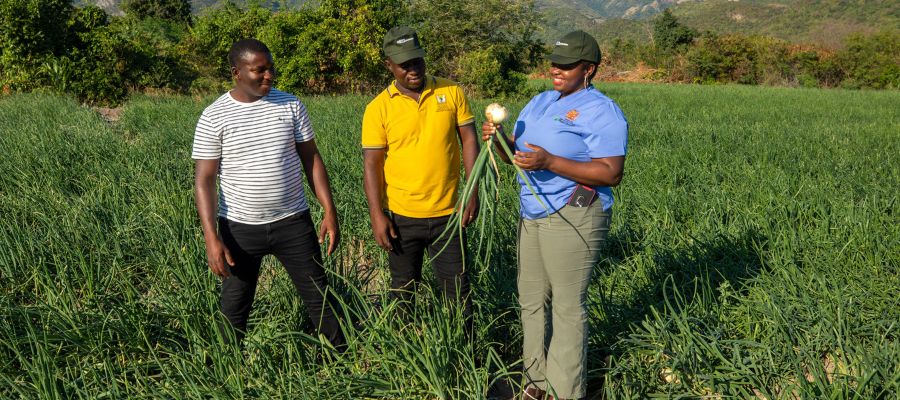
PlantwisePlus delivers digital advisory tools that boost sustainable agriculture and improve the capacity of public and private actors who support smallholder farmers to diagnose crop health problems and recommend sustainable solutions.
As such, PlantwisePlus developed the PlantwisePlus toolkit. Aimed at agricultural service providers, the new website brings together a suite of digital decision support tools. These include the PlantwisePlus Knowledge Bank, which aids in the diagnosis of crop pests and diseases and provides pest management recommendations. The Crop Sprayer mobile app helps advisors calculate pesticide dosages. The Fertilizer Optimizer app helps users to apply fertilizer more efficiently to optimize fertilizer investments.
Other apps on the toolkit include PlantwisePlus Factsheet, CABI BioProtection Portal, Pest Diagnosis Simulator app and Crop Management Simulator app.
Through the toolkit PlantwisePlus aims to increase access to intuitive decision support tools and to information that can enable advisors and farmers to make more informed decisions in their crop management.
Reducing pesticide risks
PlantwisePlus recognizes the urgent need to increase the uptake of lower-risk plant protection products by farmers. This is especially true in domestic food supply systems where there tends to be little to no crop production standard compliance.
An overreliance on chemicals has caused pests to develop resistance. Farmers are having to spend and spray more, losing time and income.
The programme enhances the use of low-risk plant protection solutions to reduce reliance on high-risk farm inputs that have adverse effects on human health and biodiversity and promote the demand for safer and locally produced food.
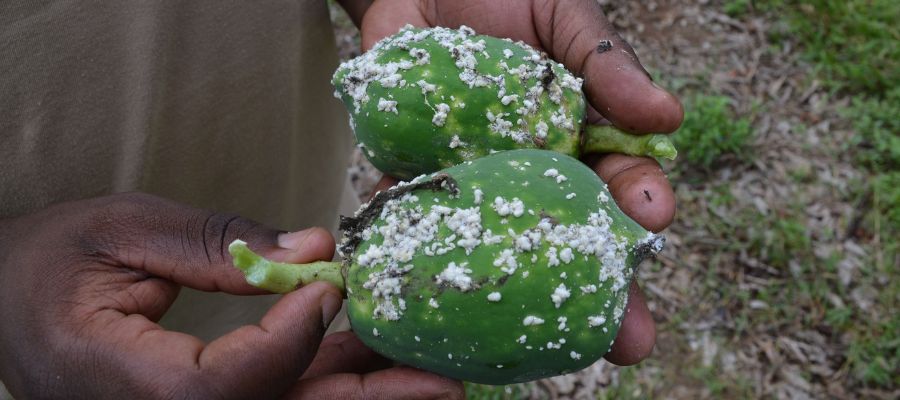
One example is PlantwisePlus’s work in Kenya to implement a classical biological control strategy to manage papaya mealybug (Paracoccus marginatus). The invasive pest has been devastating papaya crops in Kenya. A CABI study in 2019 found it caused an estimated 57% yield losses across five counties.
Alongside the Kenya Agricultural and Livestock Research Organization (KALRO) and the Kenya Plant Health Inspectorate (KEPHIS), PlantwisePlus has been testing the efficacy of the parasitoid wasp, Acerophagus papayae, as a biological control agent.
When outbreaks occur, it is not unusual for farmers in the region to spray up to 16 times in one season to control papaya mealybug, using highly hazardous pesticides. Not only are the pesticides ineffective due to the fruit’s waxy surface, but they can cause damage to the environment and human health. Classical biological control is a more environmentally friendly and ecologically-sound approach to managing plant health threats. In fact, to enable the wasp to establish, farmers must not spray chemicals at all.
Integrated Pest Management
Integrated pest management (IPM) is an environmentally friendly, holistic approach to managing crops. IPM includes various biological, chemical, physical and crop-specific (cultural) techniques. This encourages healthy crops and minimizes the use of pesticides. PlantwisePlus promotes IPM as the preferred sustainable approach to crop protection.

International Day of Plant Health
The United Nations designated May 12th as the International Day of Plant Health to increase awareness of the importance of keeping plants healthy to achieve the UN 2030 Agenda. In particular, SDG 2 – Zero Hunger.
Did you know?

84% of the world’s 570 million farmers are smallholders

33% of the world’s food is produced on small farms of less than two hectares

Pests and diseases destroy up to 40% of crops
Related News & Blogs
The role of soil health in sustainable agriculture
Previously, we have discussed the importance of soil health for agriculture, highlighting its threats and outlining protection strategies. In this blog, we dig deeper into the role of soil health in sustainable agriculture and explore its long-term ben…
18 June 2025


